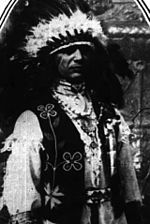Nipo T. Strongheart, Date of Birth, Place of Birth, Date of Death
TweetNipo T. Strongheart
actor, Native American technical advisor on Hollywood films
 Date of Birth: 15-May-1891
Date of Birth: 15-May-1891
 Place of Birth: White Swan, Washington, United States
Place of Birth: White Swan, Washington, United States
Date of Death: 31-Dec-1966
Profession: actor
Nationality: United States
Zodiac Sign: Taurus 
About Nipo T. Strongheart
- Nipo T.
- Strongheart (May 15, 1891 – December 31, 1966) was known as a lecturer on the Chautaqua circuit, performer in Wild West shows, and a technical advisor to Hollywood film producers.
- Throughout his life, which spanned several careers, he was an advocate for Native American issues.
- He spoke on religious issues several times, and late in life he became a member of the Bahá'í Faith. Strongheart's mother, Chi-Nach-Lut Schu-Wah-Elks, was a member of the Yakama Nation; his father was European American.
- According to some sources, Strongheart lived with his white father for most of his childhood away from the reservation and Indian culture.
- Another source says he was adopted by a Yakima woman after his mother's death, and brought up and educated in her family on the reservation.
- Strongheart performed with his father in Buffalo Bill's Wild West Show and its successors. Strongheart's public performances began in 1917, when he was in his 20s and worked for the YMCA War Work Council.
- He toured military camps across New England, where he gave presentations on Native American culture and praised military service.
- His recruiting talks encouraged hundreds of men to volunteer for war service.
- After World War I and his job ended, Strongheart moved briefly to the Yakama Indian Reservation. He soon left and had a successful career in the Lyceum and Chautauqua circuits of fairs.
- He gave presentations on Native American culture and often spoke against the problems of life on reservations, as enforced by government policy.
- He played an important role in the development of the Indian Citizenship Act of 1924, which granted citizenship to all Native Americans who did not already have it; the bill was signed by President Calvin Coolidge.
- Strongheart believed the bill would help end reservations and empower Indian culture. In his early youth, Strongheart had some experience with the fledgling film industry.
- As the audiences for the lecture circuit declined, he became involved in filmmaking.
- He was involved in a number of projects in silent film (especially Braveheart) and the developing talkies ( Pony Soldier). He also helped develop or found a number of organizations to support or represent Native Americans, including the Los Angeles Indian Center for urban Indians and the National Congress of American Indians (NCAI).
- Through Strongheart's involvement in film production, he countered stereotypes about Native Americans; he helped translate movie scripts into the languages of the Native American peoples portrayed.
- He also dealt with wardrobe and props. When Strongheart died, his will included provisions for seed money and materials to enable the Yakama Nation to build a library and museum; they developed the Yakama Cultural Center.
- In 2014 the Yakama established a permanent exhibition about Strongheart.
- Scholarly interest in him arose in 1997, when researchers were studying military service by Native Americans, and in 2006, when other scholars analyzed issues related to portrayal of and participation by Native Americans in the Hollywood film industry.
Read more at Wikipedia

